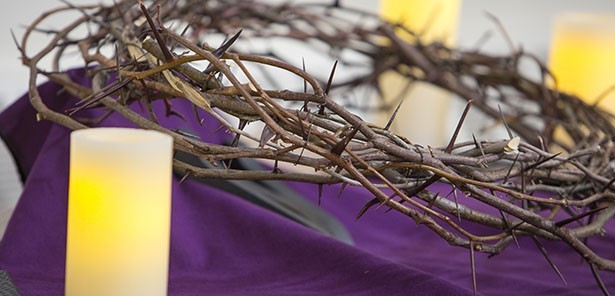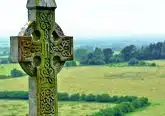January 28 – Saint Thomas Aquinas
On Jan. 28, the Roman Catholic Church celebrates Saint Thomas Aquinas, the 13th century theologian who showed that the Catholic faith is in harmony with philosophy and all other branches of knowledge.
Blessed John Paul II, in his 1998 letter “Fides et Ratio,” said St. Thomas “had the great merit of giving pride of place to the harmony which exists between faith and reason,” knowing that “both the light of reason and the light of faith come from God … Hence there can be no contradiction between them.”
Thomas was born during 1225 into a noble family, having relatives among the rulers of the Holy Roman Empire. His father Landulph was the Count of Aquino, and his mother Theodora, the Countess of Teano. At age five, Thomas was sent to study at Monte Cassino, the abbey founded by St. Benedict.
The boy’s intellectual gifts and serious disposition impressed the monks, who urged his father to place him in a university by the time he was 10. At the University of Naples, he learned philosophy and rhetoric while taking care to preserve his morals against corruption by other students.
It is said that a hermit, before Thomas’ birth, told Theodora that she would have a son who would enter the Dominican Order “and so great will be his learning and sanctity that in his day no one will be found to equal him.” In his adolescence, Thomas’ friendship with a holy Dominican inspired him to join them.
His family, however, did not envision the brilliant young man as a penniless and celibate preacher. His brothers kidnapped him from the Dominicans, took him to the family’s castle, and at one point even sent a woman to seduce him – whom Thomas drove out by brandishing a poker from the fireplace.
Under pressure from both the Pope and the Holy Roman Emperor, Thomas’ brothers allowed him to escape from captivity. He traveled to Rome and received the Pope’s blessing upon his vocation, which would soon take him to Paris to study with the theologian later canonized as Saint Albert the Great.
Thomas’ silent demeanor caused other students to nickname him “the Dumb Ox.” Albert, however, discovered that the young man was a brilliant thinker, and proclaimed: “We call him the Dumb Ox, but he will give such a bellow in learning as will be heard all over the world.”
By the time he was 23, Thomas was teaching alongside his mentor at the university of Cologne. During 1248, he published his first commentaries on the pre-Christian Greek philosopher Aristotle, whose insights on nature, logic, and metaphysics would inform Thomas’ approach to Catholic theology.
Around the middle of the century Thomas was ordained to the priesthood, in which he showed great reverence for the liturgy and skill as a homilist. In keeping with the Dominican order’s charism for preaching, he strove to bring his own family to a sincere practice of the faith, and largely succeeded.
St. Thomas’ best-known achievements, however, are his works of theology. These include the Summa Contra Gentiles, the Compendium Theologiae, and the great Summa_Theologiae – which was placed on the altar along with the Bible at the 16th century Council of Trent for easy reference during discussions.
In December 1273, however, the scholar proclaimed that he could write no more, following a mystical experience in which he said he had “seen things that make my writings look like straw.” But he complied with a request to attend the Council of Lyon to help reunite the Latin and Greek churches.
On his way there, however, Thomas became ill and stopped at a Cistercian abbey. The monks treated him with reverence, and it was to them that he dictated a final work of theology: a commentary on the Old Testament’s Song of Songs.
The saint did not live to finish this commentary, however. Nearing death, he made a final confession and asked for the Eucharist to be brought to him. In its presence, he declared: “I adore you, my God and my Redeemer … for whose honor I have studied, labored, preached, and taught.”
“I hope I have never advanced any tenet as your word, which I had not learned from you,” he told God, before making his last communion. “If through ignorance I have done otherwise, I revoke everything of that kind, and submit all my writings to the judgment of the holy Roman Church.”
His last words were addressed to one of the Cistercians who asked for a word of spiritual guidance. “Be assured that he who shall always walk faithfully in (God’s) presence, always ready to give him an account of all his actions, shall never be separated from him by consenting to sin,” he declared.
St. Thomas Aquinas died on March 7, 1274. He was canonized in 1323, and made a Doctor of the Church in 1567. In 1965, the Second Vatican Council taught that seminarians should learn “under the guidance of St. Thomas,” in order to “illumine the mysteries of salvation as completely as possible.”













